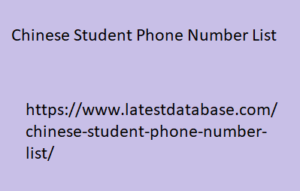|
|
These kinds of questions will help you create a very detailed customer profile or persona. I suggest coming up with at least three of them so you can target your key customer segments. Each one will generate a keyword list, though there may be some overlap between profiles. How to Find Relevant Keywords in Your Niche If you think about it, it is actually much easier to dominate your niche if you use highly specific terms as keywords. These highly specific terms refer to long-tail keywords. Long-tail keywords are very specific search phrases with low search volumes and competition – but with higher and stronger intent.
This means that these keywords clearly state what the users are looking for. I have an in-depth guide on how to find and target long-tail keywords you can follow, but the gist of it is: to use the customer profiles you made and put yourself in your target Chinese Student Phone Number List audience’s shoes. What kind of problems are they facing, and what kinds of questions might they have when they’re looking for solutions for those problems? There are two ways I find answers to these. Explore Forums One way I study this is by diving into forums. They’re a treasure trove of users looking for insights and recommendations for specific problems. It’s easy to explore, too. Just type your niche, plus “forums” on Google search, and you’ll see a list of forum posts where you can get insights.

keywords and providing a quick answer for those looking at these pages, can help you get more qualified leads down your sales pipeline. In short, targeting long-tail keywords is the easiest trick to enhancing your visibility as quickly as possible, and upping your chance of turning clicks into customers. Use Niche Keyword Generators There are a ton of SEO tools that you can use to generate broad and related keyword suggestions to the ones you have in mind. I have a list of options for you to try out in my SEO toolbox. If you’re looking for some free tools to test out, there’s Answer the Public. It takes the keyword you give it, uses autocomplete data from search engines, and then provides a list of phrases and questions (i.e., long-tail keywords) centered around that keyword
|
|